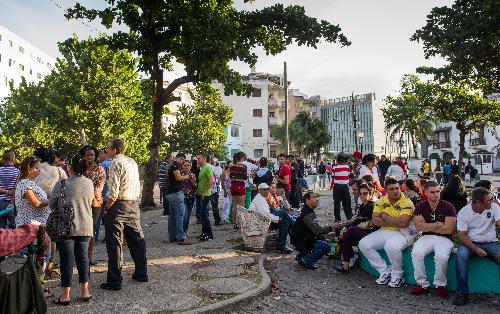|
 |
|
LONG WAIT: Cubans wait outside the U.S. Interest Office in Havana to apply for visas, on December 22, 2014 |
Amid growing international calls for the United States and Cuba to end the state of antagonism that has lasted for over five decades, U.S. President Barack Obama and Cuban leader Raúl Castro made a rare handshake at Nelson Mandela's funeral in Johannesburg, South Africa, in December 2013. The uncommon sight caught global attention and signaled the possibility of a thaw in the frozen relations between the superpower and the Caribbean island country. One year later, that foreshadowing event may soon reach fruition.
On December 17, 2014, leaders of both the United States and Cuba respectively announced they would normalize their diplomatic relationship.
In his statement, Obama said that Washington's current approach was "outdated" and the changes were the "most significant" in U.S. policy toward Cuba in 50 years. He hailed a "new chapter" in U.S.-Cuba relations.
Castro said that he welcomed the shift of U.S. policy toward Cuba in a TV address. He revealed that he had spoken with Obama by telephone on December 16 and the two sides agreed to take consistent measures for the normalization of bilateral ties.
According to the U.S. media, the announcements followed secret high-level talks held over the previous 18 months. As efforts for a détente, the United States and Cuba reached a prisoner swap deal that involves the release of two Americans and three Cubans.
Alan Gross, a contractor to the U.S. Agency for International Development, was the focal point of the U.S.-Cuba negotiations. Gross traveled to Cuba in 2009 and was arrested in December 2009 and sentenced two years later to 15 years in prison for "acts against the integrity of the state."
Gross was returned to the United States on December 17, 2014.
The Cuban Government has also freed an unnamed American intelligence officer who had been in jail in Cuba for nearly 20 years.
Meanwhile, three Cubans who had been jailed in the United States for 15 years have returned home. They are part of a group of five Cubans who U.S. prosecutors accused of spying on Cuban exiles in Florida. Two others of the five Cubans had recently been allowed to return to Cuba after finishing their sentences.
Obama's plans to normalize U.S. ties with Cuba also include: reviewing the designation of Cuba as a state sponsor of terrorism; relaxing a travel ban for U.S. citizens; easing financial restrictions; increasing telecommunications links; and making efforts to lift the 54-year-old trade embargo.
The United States said that the nation hopes to open an embassy in Havana in the coming months.
Obama's consideration
The U.S. president's statement acknowledges the failure of U.S. policy toward Cuba in the last half century, said Zhang Sengen, a researcher with the Institute of Latin America under the Chinese Academy of Social Sciences (CASS).
The U.S.-Cuba standoff stemmed from ideological confrontation and hostility during the Cold War. With unrivaled might, the United States imposed sanctions and a trade embargo on Cuba, hoping to force a U.S.-favored regime change in Cuba that did not happen.
On the contrary, the U.S. trade embargo has not been recognized by the international community. On many occasions, such as UN General Assembly and summit meetings of Latin American leaders, the U.S. policy toward Cuba was criticized.
Cuba has implemented a series of economic reforms since Raúl Castro, brother of former Cuban leader Fidel Castro, took power in 2008. The country has maintained sound relations with Latin American partners such as Venezuela and Brazil, as well as major countries in the world like China and Russia. The EU restored ties with Cuba in 2008. In June 2009, the Organization of American States voted to lift a ban on Cuba's membership imposed in 1962.
Many other Latin American countries have changed their views on the Cuba issue and have long demanded the United States abolish the trade embargo against Cuba. The United States has even been estranged by some Latin American countries, Zhang said.
| 